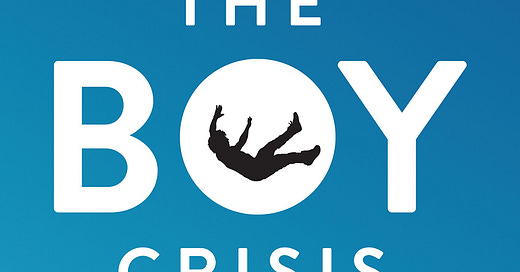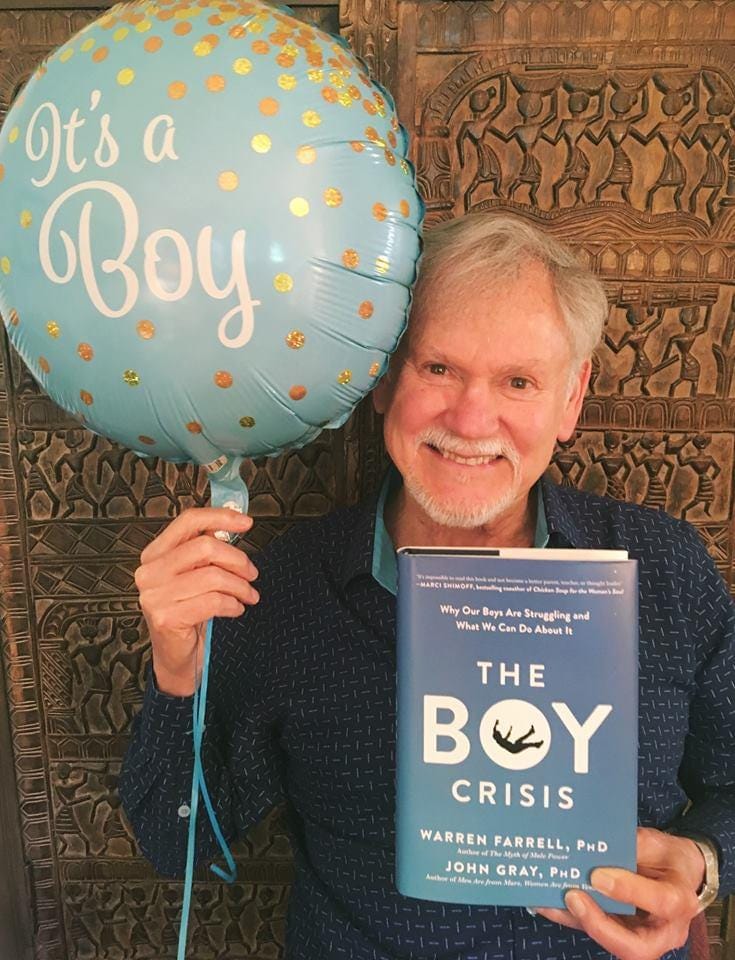Book Review: The Boy Crisis: Why Our Boys Are Struggling and What We Can Do About It by Dr. Warren Farrell and Dr. John Gray
A guide to "love with knowledge and lead with empathy.”
The Boy Crisis: Why Our Boys Are Struggling and What We Can Do About It by Dr. Warren Farrell and Dr. John Gray. Narrated by Dr. Warren Farrell and Dr. John Gray. Blackstone Publishing, 2018. 15 hours (approx.).
According to his website, Dr. Warren Farrell “is the only man ever elected three times to the Board of the National Organization for Women in NYC.” He began his career as a professor, but later took an interest in feminism. Working with NOW, he started men’s and women’s groups during the early 1970s. He wrote The Liberated Man in 1974, which offered ways husbands could support working wives.
During this same period there was a spike in divorce rates. Dr. Farrell noticed that many kids lived with their moms after a divorce. Meanwhile, dads were expected to financially support both mother and child but otherwise played little or no role in the child’s rearing. When dads didn’t pay they were labeled deadbeats. However, listening to the stories of men who attended his groups, Farrell realized dads were rarely deadbeats.
The men vented their frustrations about divorce and the courts. They were legalistic, angry and bitter. But all that was a mask to hide their true frustration - not getting more time with their kids. They were depressed. They had mounting legal fees and feelings of not being good enough. The men cried over the loss of their children.
In addition, children who went through a divorce suffered, particularly boys. As a researcher and a feminist, Farrell wondered if the suffering was due to stress or being dad deprived. He found that “dad deprivation” is the leading cause of 25 social, psychological, academic and physical problems.
In a 1997 interview with J. Steven Svobonda, Farrell said, “Everything went well until the mid-seventies when NOW came out against the presumption of joint custody. I couldn't believe the people I thought were pioneers in equality were saying that women should have the first option to have children or not to have children, that children should not have equal rights to their dads.” Farrell, a feminist, is now considered the father of the men’s rights movement.
There is also a “purpose void” which is caused by the changing roles of men and women. Men are no longer the sole provider, and so men don’t know their position in the world or in a relationship.
Together, the purpose void and dad deprivation are the leading causes of the “boy crisis.” Farrell’s book is packed with depressing research and frightening statistics that suggest we are, indeed, facing this crisis. In order for this book review to not become a parade of horribles, I will limit the examples to three.
First, boys’ suicide rates are rocketing over girls’. While their suicide rates are similar before adolescence, boys become two times more likely to suicide than girls between ages 10 and 14 and four times more likely between ages 15 and 19. It goes up again (five or six times more likely) between ages 20 and 24. Farrell suggests the cause is the social pressure on men. If a man is struggling financially (let's say) then he is more likely to feel suicidal. He says, “Worth less men consider themselves worthless.” Less it be thought that women are better at handling pressure than men, their suicide rates approach male levels when under similar pressures.
Mass shootings are exclusively committed by boys. Farrell says, “School shootings are basically homicides that are also suicides. Even if the boy doesn’t end his own life literally, for all practical purposes his life is still ended.” As for the causes of these mass shootings being media related Farrell retorts, “But our daughters live in the same homes, with the same access to the same guns, the same videogames, the same media, and they’re raised with the same family values and our daughters are not killing. Our sons are.” A mass shooting is a young man’s way of driving off a cliff at the end of mental health's long, tortuous road.
Second, men risk their lives to earn more money and create the modern world we all take for granted. Farrell calls this the “death profession bonus.” Jobs that have high risk of death pay more money. “Millions of dads with less education risk their lives to give their children options they didn’t have.” Single men will take these jobs to save money for a house or to be generally considered marriage material.
The very houses we live in depend on men risking their lives. Lumberjacks harvest the wood. Long haul truckers transport it. Fuel for the trucks is mined by oil rigs such as Deep Water Horizon. Construction workers build the house. All these are high risk jobs. Also, a coal miner or firefighter may die years after retirement from inhaled toxins. “Death after the job takes 12 times as many of our sons’ lives as death on the job,” says Farrell. These jobs are “glass cellar” or “glass floor” jobs: mostly male.
Farrell quotes the evolutionary biologist Randolph Nesse: “‘If you could make male mortality rates the same as female rates you would do more good than curing cancer.’”
Third, boys are giving up on school. They are three times more likely to be expelled. In the U.S. by 8th grade 41% of girls are proficient in writing as opposed to 20% of boys. More frightening:
In a study of boys and girls in the United States at the primary level when it comes to standardized tests versus grade, “Boys who perform equally well as girls on reading, math and science tests are graded less favorably by their teachers.” Interestingly, the boys who behaved in the classroom in ways the study identified as more commonly associated with girls - for example, being attentive and eager - did receive grades equal to girls who scored equally in standardized tests.
Put more simply, teachers are discriminating against boys.
There are more examples of how men and boys are falling behind including a lack of access to healthcare, but these three are sufficient to illustrate Farrell’s point.
The compounding effects of a purpose void and dad deprivation is causing a boy crisis. Why are we not doing anything about it? One answer could be the “gender empathy gap.” Farrell says, “For much of our history blindness to boys’ deaths is a way we as a society have survived.” This refers to boys fighting wars or going on dangerous hunts to provide food. It’s part of our evolutionary makeup to risk boys for the greater good. And we socially bribe boys with sex and acclaim to risk themselves. It still goes on today: a football star risks a concussion or severe spine injury for the approval of the audience and a chance with the head cheerleader. With sons likely to die, humanity could not afford to become psychologically attached to sons as they could with daughters.
Should women care? Imagine a row boat with men on one side and women on the other. If one side rows, the boat goes in circles. It is only when both sides are rowing in harmony that the boat moves forward. “We are all rowing the same family boat,” says Farrell. “Between the sexes there is no such thing as winning. Whenever only one sex wins, both sexes lose.”
Amazingly, the purpose void and dad deprivation enable terrorist organizations such as Isis to recruit boys. This means everybody's safety is being jeopardized by the boy crisis. It also means more tax money spent on military operations, homeland security and veteran healthcare.
The boy crisis creates more crime.
It makes boys more vulnerable to sexual predators.
We spend lots of money on crime prevention, investigations and the building and maintaining of prisons. Wealth fare is too often used as a substitute for a husband. All this plus the tax revenue lost due to unemployed men is estimated at $1 trillion.
There are also psychological costs - namely, the fear of school shootings.
The Boy Crisis is not all doom and gloom, however. Farrell offers practical suggestions that parents can use to help their sons. One solution is simple: have a family dinner twice a week. This provides a son opportunities to discuss problems and strategize for solving them. Another solution is obvious: to combat dad deprivation, keep dads involved. To this end, parents can socialize boys to be involved dads. Boys should also be provided universal communication training in primary schools. Boys and men have latent emotional intelligence and empathy but are not valued for it and so these traits remain dormant. To activate their emotional intelligence, society must value males for these traits.
In the event of a necessary divorce, fathers should get equal time with their children. Farrell suggests a number of ways to facilitate this such as living within 20 minutes of the mother so as to uncomplicate the logistics of joint custody.
To solve the purpose void, parents can help boys find new purposes based on their personality and values. For example, they can encourage boys to become homemakers just as they encourage girls to become CEO’s.
To keep boys alive and healthy, parents can educate boys for “health intelligence.” This means, in part, redefining masculinity as thinking for oneself as opposed to caving to the social bribes mentioned above. Boys should be taught to be emotional, to listen and to be assertive but not aggressive. “Health intelligence is not a façade of strength but the strength to not have a façade,” explains Farrell.
In the past, discipline and the necessity of physical labor reduced ADHD in children. Now, kids have more freedom to do what they want. Fewer boundaries, a bad diet and no exercise has led to a rise in ADHD, especially in boys. Meanwhile, prescription drugs may harm their brains. Dr. John Gray offers alternative ways to alleviate ADHD. Among Gray’s more conventional treatments are diet and exercise. But he also suggests unconventional treatments such as hot water baths. Apparently, the hot water mimics having a fever, and having a fever triggers the brain to heal itself.
Besides stats and research, Farrell and Gray make use of anecdotes. Some of them are infuriating. For example, a college couple set out to discover what healthcare services their university supplies. The girlfriend found many free services from mental health counseling to Pap tests. The boyfriend found virtually nothing. Technically this is illegal, but the law is unenforced.
The Obama and Trump administrations failed to create a council for boys - a council that would have worked synergistically with the White House Council on Women and Girls established by Obama in 2009. But Farrell is currently chair of the Coalition to Create a White House Council on Boys and Men with the aim to create such a council. Perhaps he will be successful.
In the meantime, we have The Boy Crisis to help inform and guide sons and daughters. As Farrell says, “You may wish to give this book directly to your son so he may discover himself as well as directly to your daughter so she may love with knowledge and lead with empathy.”





For a long time I've thought that American culture isn't doing the right thing for boys; I'm glad that this book offers some possible solutions. I'm certainly going to acquire a copy. Thanks for writing this review.